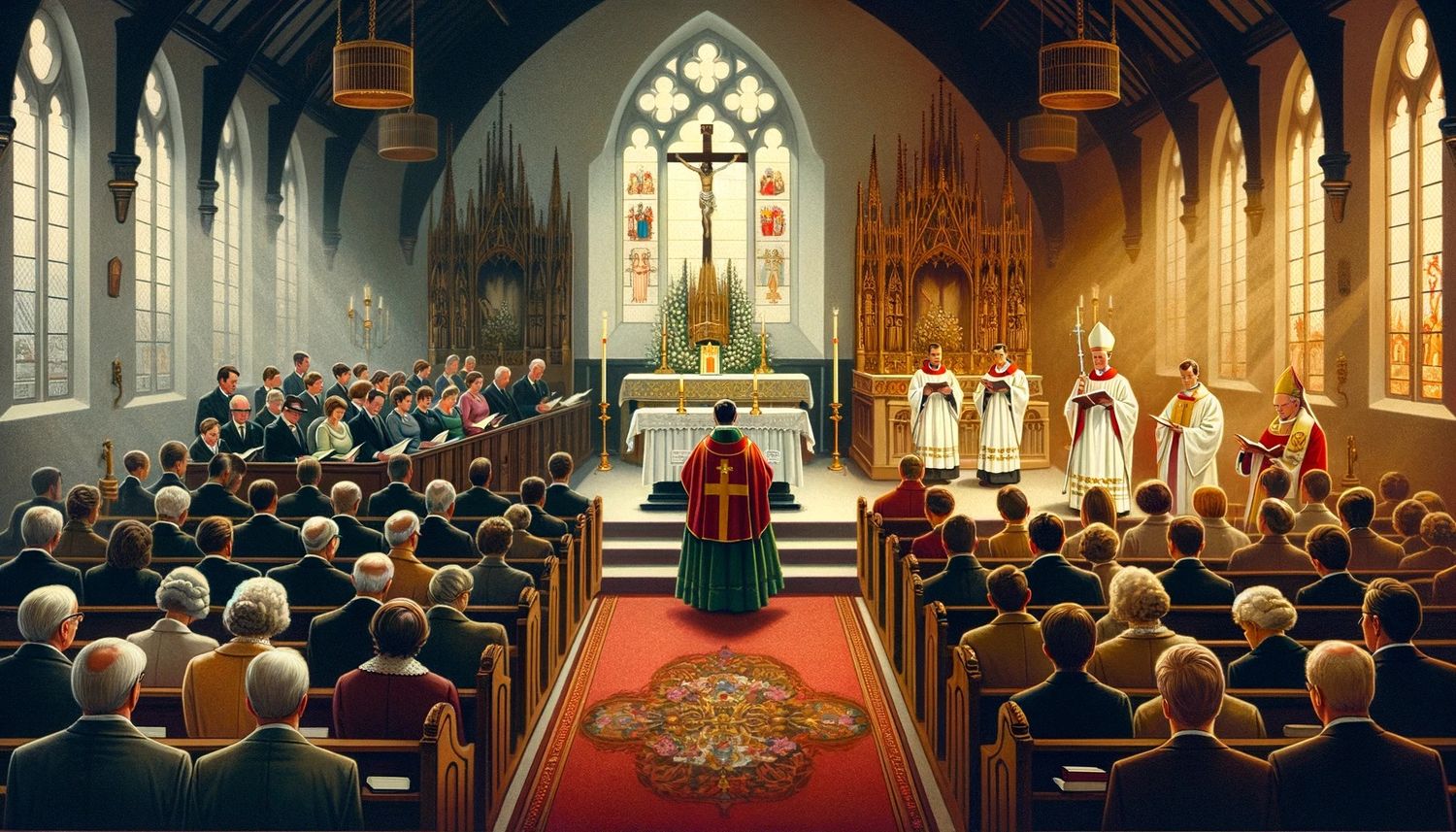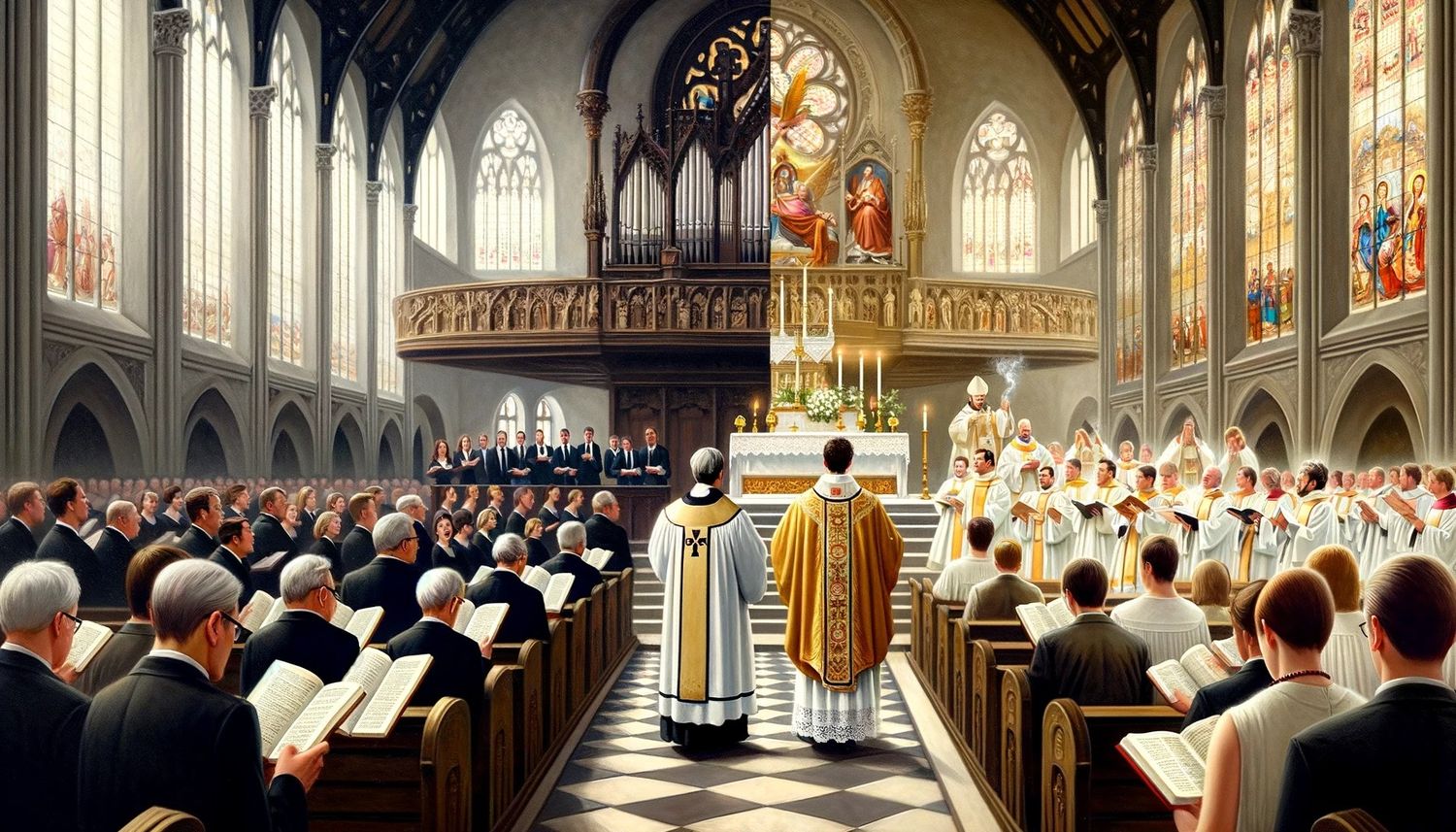Home>Theology and Spirituality>How Does Catholicism And Christian Democracy Differ


Theology and Spirituality
How Does Catholicism And Christian Democracy Differ
Published: February 15, 2024
Peter Smith, Editorial Director at Christian.net, combines deep insights into faith, politics, and culture to lead content creation that resonates widely. Awarded for his contributions to religious discourse, he previously headed a major organization for religious communicators, enhancing dialogue on faith's societal impacts.
Discover the distinctions between Catholicism and Christian Democracy in terms of theology and spirituality. Explore the unique beliefs and principles that set them apart. Gain insights into their core differences.
(Many of the links in this article redirect to a specific reviewed product. Your purchase of these products through affiliate links helps to generate commission for Christian.net, at no extra cost. Learn more)
Table of Contents
Introduction
Catholicism and Christian Democracy are two distinct yet interconnected entities that have significantly shaped the religious, political, and social landscapes throughout history. While Catholicism is a religious faith with deep spiritual and theological roots, Christian Democracy is a political ideology that draws inspiration from Christian principles. Understanding the differences and connections between these two entities is crucial for comprehending their individual impacts on society and their combined influence on political systems.
Throughout the centuries, Catholicism has been a dominant force in shaping the beliefs, values, and moral framework of millions of individuals worldwide. With its rich traditions, sacramental practices, and adherence to the teachings of Jesus Christ, Catholicism has established itself as a cornerstone of spirituality for countless adherents. On the other hand, Christian Democracy, as a political ideology, seeks to integrate Christian values into governance, emphasizing social justice, solidarity, and the common good.
Exploring the relationship between Catholicism and Christian Democracy unveils a complex interplay of religious doctrine and political philosophy. While Catholicism provides the spiritual foundation for Christian Democracy, the latter translates these spiritual principles into actionable policies and governance strategies. This interconnection has profound implications for the ethical and moral dimensions of political decision-making, as well as for the broader societal fabric.
In this article, we will delve into the historical background, core beliefs, and values of Catholicism and Christian Democracy, examining their distinct features and uncovering the ways in which they intersect. Additionally, we will explore the political and social influence wielded by these entities, shedding light on their roles in shaping policies, fostering social cohesion, and advocating for the marginalized. By gaining a deeper understanding of the nuances and dynamics between Catholicism and Christian Democracy, we can appreciate the profound impact they have had and continue to have on the world at large.
Read more: Differences Of Catholicism And Christianity
Historical Background of Catholicism and Christian Democracy
Catholicism, with its roots tracing back to the teachings of Jesus Christ and the apostles, has evolved over two millennia into a global religious institution. The early Christian community, centered in Jerusalem, gradually spread across the Roman Empire, leading to the establishment of the Catholic Church as a unifying force for believers. The church played a pivotal role in preserving and disseminating Christian teachings, contributing to the development of theology, liturgy, and ecclesiastical structures. The Great Schism of 1054 resulted in the division between the Western (Catholic) and Eastern (Orthodox) branches of Christianity, solidifying the distinct identity of the Catholic Church.
Christian Democracy, on the other hand, emerged as a political movement in 19th-century Europe, particularly in response to the social and economic challenges brought about by industrialization. Influenced by Catholic social teaching and the encyclicals of Pope Leo XIII, Christian Democracy sought to address the plight of the working class and promote social justice within a framework of Christian ethics. This movement gained traction in countries such as Germany, Belgium, and Italy, advocating for policies that upheld human dignity, subsidiarity, and solidarity.
The historical trajectory of Catholicism and Christian Democracy reveals a symbiotic relationship, with the former providing the moral and ethical foundation for the latter. Catholic social doctrine, articulated through encyclicals and the teachings of various popes, has significantly influenced the development of Christian Democratic principles, emphasizing the dignity of the human person, the common good, and the preferential option for the poor. This convergence of religious and political thought has shaped the governance and policies of nations, particularly in Europe and Latin America, where Christian Democratic parties have played pivotal roles in shaping social welfare systems and labor rights.
The historical interplay between Catholicism and Christian Democracy underscores the enduring impact of religious values on political ideologies and governance. As we delve deeper into their historical contexts, we gain insight into the intricate connections between faith, ethics, and public policy, illuminating the profound influence these entities have exerted on the course of history.
Core Beliefs and Values of Catholicism
At the heart of Catholicism lies a rich tapestry of core beliefs and values that have guided the faith and its followers for centuries. These foundational principles serve as the bedrock of Catholic theology and spirituality, shaping the worldview of millions of adherents worldwide. Central to Catholic belief is the affirmation of the Holy Trinity – the Father, Son, and Holy Spirit – as the fundamental mystery of the Christian faith. This belief underscores the divine nature of God and the interconnectedness of the three persons within the Godhead.
The sacramental nature of Catholicism is another cornerstone of the faith, emphasizing the significance of rituals and symbols as conduits of divine grace. The seven sacraments, including baptism, Eucharist, and reconciliation, hold profound significance in the lives of Catholics, serving as visible signs of God's presence and transformative power. These sacraments not only foster spiritual growth but also cultivate a sense of communal belonging and solidarity among the faithful.
Central to Catholic moral and ethical teachings is the concept of human dignity, rooted in the belief that every individual is created in the image and likeness of God. This foundational principle underpins the Church's stance on social justice, human rights, and the sanctity of life from conception to natural death. The promotion of human dignity extends to advocacy for the marginalized, the poor, and the vulnerable, reflecting the compassionate ethos of Catholic social teaching.
Furthermore, the Catholic Church upholds the authority of sacred tradition, alongside the Scriptures, as a source of divine revelation. This emphasis on tradition underscores the continuity of faith across generations and the significance of the Church's magisterium in interpreting and safeguarding the deposit of faith. The teachings of the Church, guided by the Holy Spirit, provide moral guidance and doctrinal clarity, offering a compass for navigating contemporary ethical challenges.
The values of compassion, mercy, and solidarity permeate the fabric of Catholicism, inspiring acts of charity, service, and advocacy for the common good. The call to love one's neighbor as oneself, exemplified in the life of Jesus Christ, forms the ethical imperative for Catholics to engage in works of mercy and pursue social justice. This commitment to compassion and solidarity underscores the transformative impact of Catholicism on individual lives and communities, fostering a sense of interconnectedness and shared responsibility.
In essence, the core beliefs and values of Catholicism encapsulate a profound reverence for the divine, a commitment to human dignity and solidarity, and a moral framework rooted in compassion and justice. These principles continue to shape the spiritual identity of Catholics and resonate as enduring pillars of the faith, offering guidance and inspiration in navigating the complexities of the modern world.
Core Beliefs and Values of Christian Democracy
Christian Democracy, as a political ideology, is underpinned by a set of core beliefs and values that reflect its commitment to integrating Christian principles into governance and public policy. At the heart of Christian Democracy lies a profound reverence for human dignity, solidarity, and the pursuit of the common good. These foundational principles serve as guiding beacons, shaping the ethical framework and policy orientation of Christian Democratic parties and movements.
Central to the ethos of Christian Democracy is the unwavering affirmation of human dignity. Rooted in the Christian understanding of the inherent worth of every individual as a creation of God, this belief forms the moral imperative for upholding human rights, promoting social justice, and safeguarding the well-being of all members of society. The recognition of human dignity as a foundational principle informs the approach of Christian Democratic policies, emphasizing the protection of vulnerable populations, the empowerment of marginalized communities, and the cultivation of a society where every person is valued and respected.
Solidarity, another fundamental value of Christian Democracy, underscores the interconnectedness of humanity and the collective responsibility to ensure the welfare of all members of society. Informed by Christian teachings on love of neighbor and care for the vulnerable, solidarity serves as a guiding principle for fostering inclusive and compassionate governance. Christian Democratic ideology emphasizes the importance of building social structures that promote solidarity, equity, and mutual support, transcending individualism and advancing the well-being of the entire community.
The pursuit of the common good stands as a cornerstone of Christian Democratic thought, reflecting a commitment to governance that prioritizes the flourishing of all individuals and the broader societal welfare. Informed by Christian social ethics, the concept of the common good emphasizes the creation of conditions where every person can realize their full potential, where justice and equity prevail, and where the needs of the most vulnerable are addressed. Christian Democratic policies are oriented towards advancing the common good, seeking to create a society where the dignity of every person is upheld, and where opportunities for growth and fulfillment are accessible to all.
Furthermore, Christian Democracy places a strong emphasis on subsidiarity, advocating for decision-making to occur at the most local and effective level, closest to the individuals and communities affected. This principle aligns with the Christian Democratic vision of empowering individuals and local institutions to actively participate in shaping their own destinies, fostering a sense of ownership and responsibility within communities.
In essence, the core beliefs and values of Christian Democracy encapsulate a deep commitment to human dignity, solidarity, the common good, and subsidiarity. These principles serve as the moral compass guiding Christian Democratic policies and actions, reflecting a vision of governance deeply rooted in Christian ethics and the promotion of a just and compassionate society.
Relationship Between Catholicism and Christian Democracy
The relationship between Catholicism and Christian Democracy is characterized by a profound interconnection, where religious principles intersect with political ideology to shape governance, policies, and societal values. At its core, Catholicism provides the spiritual and moral foundation upon which Christian Democracy builds its ethical framework and policy orientation. The rich tapestry of Catholic social teaching, emphasizing human dignity, solidarity, and the common good, serves as a wellspring of inspiration for Christian Democratic principles, infusing governance with a deep sense of social responsibility and ethical stewardship.
Catholicism's emphasis on the dignity of the human person resonates deeply within the ethos of Christian Democracy, informing policies that prioritize the well-being and rights of individuals within society. The recognition of human dignity as a fundamental principle underscores the commitment of Christian Democratic movements to advocate for social justice, protect vulnerable populations, and address systemic inequalities. This alignment of values fosters a symbiotic relationship, where the moral imperatives of Catholicism find expression in the policies and actions of Christian Democratic entities.
Moreover, the concept of solidarity, deeply rooted in Catholic social doctrine, serves as a guiding principle for Christian Democracy, shaping governance that promotes inclusivity, mutual support, and the cultivation of a cohesive societal fabric. The interconnectedness of humanity, underscored by the principle of solidarity, informs Christian Democratic policies aimed at fostering a sense of community, addressing disparities, and advancing the welfare of all members of society. This shared commitment to solidarity establishes a harmonious relationship between Catholicism and Christian Democracy, where the ethical precepts of the former permeate the social and political initiatives of the latter.
Additionally, the pursuit of the common good, a central tenet of Catholic social teaching, aligns with the policy orientation of Christian Democracy, emphasizing governance that prioritizes the flourishing of all individuals and the broader societal welfare. Christian Democratic movements draw inspiration from the Catholic emphasis on the common good, seeking to create conditions where justice, equity, and the well-being of the most vulnerable are paramount. This convergence of values underscores the intrinsic relationship between Catholicism and Christian Democracy, where the pursuit of the common good serves as a unifying force in shaping policies that reflect a shared commitment to social justice and ethical governance.
In essence, the relationship between Catholicism and Christian Democracy is characterized by a profound synergy, where the moral and ethical precepts of Catholicism find resonance in the policies, values, and governance strategies of Christian Democratic movements. This interconnectedness underscores the enduring influence of religious values on political ideologies, shaping a vision of governance deeply rooted in compassion, justice, and the promotion of human dignity.
Read more: How Does Lutheran Differ From Catholicism
Political and Social Influence of Catholicism and Christian Democracy
The political and social influence of Catholicism and Christian Democracy extends across centuries, leaving an indelible mark on governance, public policy, and societal values. Catholicism, as a global religious institution, has wielded significant influence in shaping the moral and ethical fabric of societies, advocating for social justice, human rights, and the dignity of every individual. The teachings of the Catholic Church, rooted in the Gospel and articulated through encyclicals and pastoral letters, have permeated the realms of politics and governance, inspiring movements for social reform, humanitarian initiatives, and advocacy for the marginalized.
Christian Democracy, as a political ideology, has likewise exerted a profound influence on the political landscape, particularly in Europe and Latin America. Grounded in Christian principles, Christian Democratic movements have played pivotal roles in shaping governance structures that prioritize human dignity, solidarity, and the common good. The influence of Christian Democracy is evident in the development of social welfare systems, labor rights protections, and policies aimed at addressing economic disparities and fostering inclusive societies.
The intersection of Catholicism and Christian Democracy has engendered a collective influence that transcends the realms of faith and politics, permeating the social fabric of nations. The commitment to human dignity, solidarity, and the common good, shared by both entities, has contributed to the advancement of policies that seek to address systemic injustices, promote equity, and uphold the rights of all individuals. This shared influence has been particularly pronounced in the realms of education, healthcare, and social services, where Catholic institutions and Christian Democratic initiatives have collaborated to address societal needs and advocate for the empowerment of the marginalized.
Furthermore, the ethical framework provided by Catholic social teaching has informed the policy orientation of Christian Democratic movements, fostering governance that prioritizes the welfare of all members of society. This influence has been instrumental in shaping legislative agendas, social programs, and international advocacy efforts aimed at addressing global challenges such as poverty, migration, and environmental stewardship.
In essence, the political and social influence of Catholicism and Christian Democracy reflects a shared commitment to advancing the well-being of individuals and communities, fostering governance that is rooted in compassion, justice, and the promotion of human dignity. This collective influence continues to shape the ethical dimensions of public policy and governance, underscoring the enduring impact of religious values on the political and social landscapes.
Conclusion
In conclusion, the intricate relationship between Catholicism and Christian Democracy underscores a profound interplay of religious doctrine and political philosophy, shaping the moral and ethical dimensions of governance and societal values. Throughout history, Catholicism has provided the spiritual and moral foundation upon which Christian Democracy has built its ethical framework, drawing inspiration from the rich tapestry of Catholic social teaching. The core beliefs and values of Catholicism, centered on the affirmation of human dignity, the promotion of solidarity, and the pursuit of the common good, have resonated deeply within the ethos of Christian Democracy, guiding policies that prioritize social justice, inclusivity, and the welfare of all members of society.
The historical trajectory of Catholicism and Christian Democracy reveals a symbiotic relationship, where the moral imperatives of the former find expression in the policies and actions of the latter. This interconnectedness has engendered a collective influence that transcends the realms of faith and politics, permeating the social fabric of nations. The commitment to human dignity, solidarity, and the common good, shared by both entities, has contributed to the advancement of policies that seek to address systemic injustices, promote equity, and uphold the rights of all individuals.
Furthermore, the enduring influence of Catholicism and Christian Democracy is evident in their impact on governance, public policy, and societal values. The teachings of the Catholic Church, rooted in the Gospel and articulated through encyclicals and pastoral letters, have permeated the realms of politics and governance, inspiring movements for social reform, humanitarian initiatives, and advocacy for the marginalized. Christian Democratic movements, grounded in Christian principles, have played pivotal roles in shaping governance structures that prioritize human dignity, solidarity, and the common good, contributing to the development of social welfare systems, labor rights protections, and policies aimed at fostering inclusive societies.
In essence, the relationship between Catholicism and Christian Democracy reflects a shared commitment to advancing the well-being of individuals and communities, fostering governance that is rooted in compassion, justice, and the promotion of human dignity. This collective influence continues to shape the ethical dimensions of public policy and governance, underscoring the enduring impact of religious values on the political and social landscapes. As we navigate the complexities of the modern world, the profound interconnection between Catholicism and Christian Democracy serves as a testament to the enduring influence of faith on the pursuit of a just and compassionate society.














